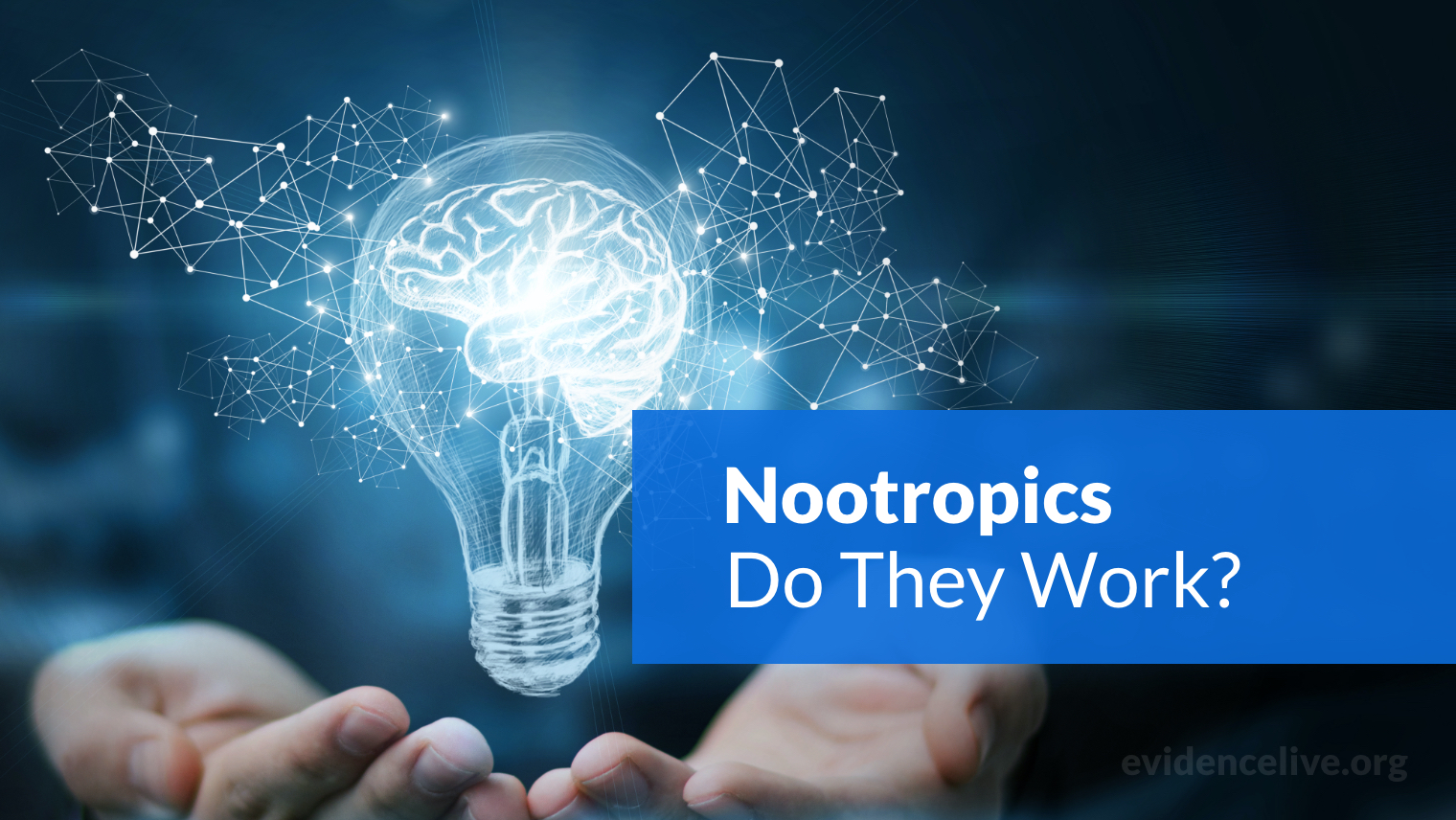Do these brain-boosting supplements actually live up to the hype or fall short of their promised claim?
To start things off, nootropics have now achieved a status that is reasonably broad-based. The term gets used loosely to refer to any substance that promises to improve brain function.
Anyone looking for a way to feel more alert, to reinvigorate memory, or ward off age-related cognitive issues has likely considered using brain supplements. However, there are concerns regarding their efficacy and safety.
To investigate whether nootropics really work and what benefits they can offer, we have compiled our evidence sourced from clinical and scientific studies.
Contents
What Are Nootropics, and What Do They Do?
Nootropics are substances that offer a range of cognitive benefits, including the following:
- Improved alertness
- Memory enhancement
- Increased mental clarity
- Reduced brain fog
- Quicker reaction time
- Heightened motivation
- More creativity
- Overall improved cognitive performance
While this is an impressive list of benefits, there are certain conditions that the best nootropics need to meet to be classified as such.
For instance, a true nootropic should show improved learning and short-term memory retention. They should also increase resilience to trauma and stress hormones and provide neuroprotective properties.
The dietary supplements should be safe for brain health without presenting any side effects. That being said, there are different types of nootropics, as discussed below.
Prescription Nootropics
Prescription nootropics, like prescription drugs, are prescribed by medical professionals to treat specific conditions.
For the most part, these supplements work as stimulants for well-researched conditions, although they are not all without side effects.
As with any prescription medication, expert advice must always follow through to avoid any adverse effects.
Synthetic Compounds (Smart Drugs)
Synthetic nootropics, also known as smart drugs, are manufactured in labs. These artificial supplements work along the lines of providing cognitive benefits but with the use of chemical ingredients.
While some synthetic nootropics are available as over-the-counter options, others overlap with prescription nootropics.
Natural Nootropics
This type is deemed the safest to use as natural nootropics include plant extracts and herbs that have been studied for their cognitive enhancing potential.
Many natural nootropics have a long history of use in traditional and alternative medicine compared to their synthetic counterparts.
Still, they are not FDA regulated, so producers can’t make specific claims. These supplements are available without a prescription.
Do Nootropics Work for Brain Aging?
The popularity of nootropic supplements rests on their reputation to improve memory, learning, focus, and overall cognitive performance, with some substances offering multiple benefits while others promote a particular perk.
Among the many amino acids, vitamins, antioxidants, choline sources, and others that qualify as “Smart Drugs,” some supplements act in the short-term, working for a few hours to enhance brain function and performance.
Then there are others better known to support long-term cognitive health and improved mental performance in healthy adults.
But the common denominator between any nootropics, offering whether long-or short-term benefits, is that these nootropics work in the body to improve brain function eventually.
Their working mechanism is identified by research in the following different ways:
- Improve brain energy by promoting the production of cellular energy in neurons or enhancing energy metabolism.
- Support cerebral blood flow by dilating blood vessels in the brain to circulate adequate oxygen, glucose, and ketones to the brain.
- Manage neurotransmitter levels in the brain for optimal performance.
- Regulate brain inflammation by neutralizing free radicals and reducing oxidative stress.
- Provide neural support to maintain existing neurons as well as growing new brain connections.
In terms of dosage, manufacturers usually have a recommended amount to get the most out of the brain-boosting effects of taking these cognitive enhancers.
The suggested amount typically provides the safest optimal dose for healthy adults, and reputable suppliers will go through rigorous testing to determine that number.
However, the good thing with nootropics is that dosing can be a flexible process.
In other words, you can determine your optimal dose to boost brain performance and see what works best for you.
We suggest using what is known as Minimum Effective Dose or MED, which is the smallest dose your body needs to get the maximum benefits.
This way, you can up your dose safely without experiencing any side effects.
For prescription varieties, a medical practitioner sets the dosage that can be modified based on the individual’s needs.
Which Nootropic Compounds Are Effective?
Different nootropic supplements work in different ways to boost brain performance.
While some act as stimulant drugs such as caffeine, others work as relaxants. Some deliver instant short-terms results, whereas others cater to long-term cognitive benefits.
Yet others work as adaptogens, helping the body adapt to stress, reducing anxiety, improving mood, and even helping you sleep better.
So, to answer the question “Do nootropics work?” here is a look at some of the most well known and well-studied options:
Caffeine
Perhaps the best-known stimulant in the world, caffeine is no stranger to people in the nootropic community.

It is known well for stimulating the metabolic and central nervous systems improving cognitive function concerning alertness, focus, and wakefulness for healthy adults.
Caffeine is a quick-acting nootropic delivering instant, short-term results. It gets absorbed almost immediately, yielding an immediate stimulatory effect.
It makes its way quickly to the brain, impacting neurotransmitters that improve energy, concentration, vigilance, and high mental performance.
Despite the well-known effects of a caffeine high, it remains one of the most addictive substances around. And getting too much caffeine in the system can develop tolerance to its positive effects.
L-Theanine
L-theanine is an amino acid sourced from the leaves of the camellia Sinensis plant. Commonly known as green tea, sipping a cup yields a calming effect.

This effect is believed to come from the amino acid, L-theanine which people have long used to lower anxiety and as a sleep aid.
Some studies suggest that L-theanine helps with increasing adaptability to stress and reducing the stress response (1).
L-theanine is generally considered safe for healthy adults when used in supplemental form or as a tea. However, given its caffeine content, the National Institute of health cautions against drinking more than five cups of green tea daily.
L-theanine is often used alongside caffeine in performance-enhancing supplements for maximum potency. As caffeine stimulates higher focus, motivation, and concentration, L-theanine counters these excitatory effects with its calming properties (2).
It helps neutralize the effects of an increased heart rate, calms jitters and anxiety when using caffeine alone.
This mechanism makes the dynamic duo of caffeine and l-theanine a very potent and popular one.
Creatine
Creatine is a nutritional supplement that is very popular among people like athletes and bodybuilders to supply energy to muscles.

It is a natural nutrient that is a combination of three amino acids. Still, alongside providing energy to muscles, studies show creatine to be a brain booster with the following nootropic potential:
- Clears brain fog
- Reduces mental fatigue
- Provides cognitive enhancement
- Promotes faster thinking
- offers neuroprotection
Much of this activity becomes possible with creatine’s ability to allow brain cells to store energy within later use.
This extra energy lets you do more work or perform more effectively (3).
But perhaps the greatest credential creatine can boast is that it is extremely well studied.
Compared with other nootropics, creatine has over a century of research and human studies to back it up since it was first discovered in 1832.
Bacopa Monnieri
Bacopa monnieri is among dietary supplements that have long been used to improve memory and reduce anxiety.

More recently, research suggests that it may help offer neuroprotection by rebuilding damaged neurons (4).
If you look at smart drugs available today, you will find bacopa monnieri to be a staple in the most well-known nootropic supplements.
Some studies have shown this natural nootropic to be effective for boosting short-term memory and communication by improving electrical impulses’ signaling between neurons.
With an improvement in interneuronal communication, you will also experience benefits like better focus, faster memory formation, and quicker memory recall.
Bacopa monnieri is also an adaptogen that may help to prevent the physical and mental effects of stress.
Rhodiola Rosea
Rhodiola Rosea is an anxiolytic herb that reduces stress, fights fatigue, and improving resilience.

Studies show this nootropic to be helpful for neuroprotection, supporting cognitive enhancement, and preventing cognitive decline with regards to its brain-boosting potential.
As an antioxidant, rhodiola rosea also shows potential, where it wards off free radical activity to protect neural pathways in the brain.
Ginkgo Biloba
A natural cognitive enhancer, ginkgo biloba is a natural nootropic used to improve attention span, boost memory retention, slow age-related cognitive decline, and improve cerebral circulation.

Much of this activity occurs as ginkgo biloba can maintain neurotransmitter levels in the brain. For instance, ginkgo biloba can increase dopamine levels which helps reduce anxiety.
With improving circulation in the brain, you can feel effects like improved thinking, reaction time, energy, and memory.
The ginkgo plant is plentiful in many beneficial compounds, but two that have received the most attention are flavonoids and terpenoids.
The former are potent antioxidants that neutralize free radicals, and the latter helps the body by improving blood flow.
Panax Ginseng
Panax ginseng, also known as Asian ginseng, is one of the most well-researched herbs worldwide.

Its efficacy for improved brain function, including cognition, memory, healthy brain aging, and anti-stress properties, is well studied and backed by several clinical trials (5).
Panax ginseng affects mood and stress by acting as an adaptogen to help reduce adrenal fatigue and provide an anti-stress effect.
The nootropic also posses antioxidant properties that prevent free radicals from damaging brain cells. This mechanism, in turn, preserves memory loss and protects against age-related mental decline.
And finally, Panax ginseng is a promising neuroprotective agent that safeguards the brain from conditions that affect its memory and information retention ability.
Adderall (Amphetamines)
Adderall is a smart drug that has gained momentum as a quick fix to increasing alertness, improving cognitive function and productivity among people from all walks of life.

As an amphetamine, Adderall raises neurotransmitter levels in the brain, resulting in better focus, wakefulness, less impulsivity, and depression. It also has stimulant properties that increase blood pressure and heart rate.
Often, Adderall is typically recommended for people with Attention Deficit Hyperactivity Disorder (ADHD) tendencies, whereby increasing dopamine levels in the brain can provide a sedative effect (6).
Administered as a prescription medication, Adderall is recommended for people who need help with:
- Staying alert during the day
- Concentrating on tasks for more extended time periods
- Improving focus
- Reducing distractions
- Lowering fatigue
Despite its popularity, Adderall is not available without a prescription.
Methylphenidate (Ritalin)
Methylphenidate is a central nervous system stimulant acting on brain chemicals and nerves, which contribute to hyperactivity and impulse control.
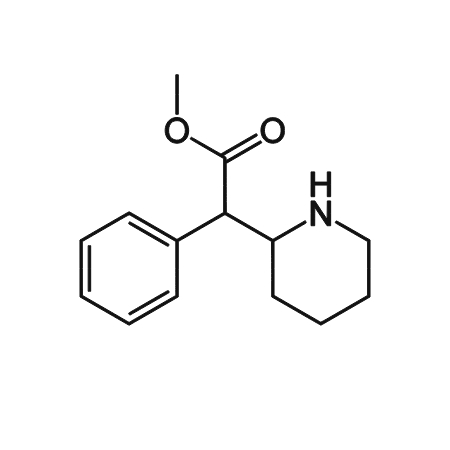
Like Adderall, it is used to treat people with ADD, ADHD, and narcolepsy. Methylphenidate is the main ingredient in the smart drug Ritalin.
Methylphenidate impacts brain function to lead to restrained anxiety and longer attention spans to control specific nervous reactions in conditions like ADD and ADHD.
For sleep-related disorders such as narcolepsy and acute insomnia, methylphenidate helps to correct extreme daytime drowsiness and flagging at night.
Omega-3 Fatty Acids
Omega-3 fatty acids are a type of polyunsaturated fats. They are essential fats as the body can’t make them and need to be sourced from the diet.

The highest source of omega-3 fatty acids is fish and seafood, with some plant foods like flaxseeds, chia seeds, walnuts, navy beans, and avocadoes being excellent sources.
There are three types of omega-3 fatty acids, namely:
- Alpha-linolenic Acid (ALA)
- Eicosapentaenoic Acid (EPA)
- Docosahexaenoic Acid (DHA)
On the nootropic front, omega 3s are vital for maintaining normal brain function throughout life.
These fatty acids are present abundantly within the cell membranes of brain cells, preserving cell membrane health and facilitating communication between cells (7).
Many people experiencing mild memory loss or others looking to improve memory can also benefit from using omega 3s.
Racetams (Piracetam, Phenotropil)
Racetams are a class of synthetic nootropics or cognitive enhancers aiming to improve various brain functions and add to overall brain health.
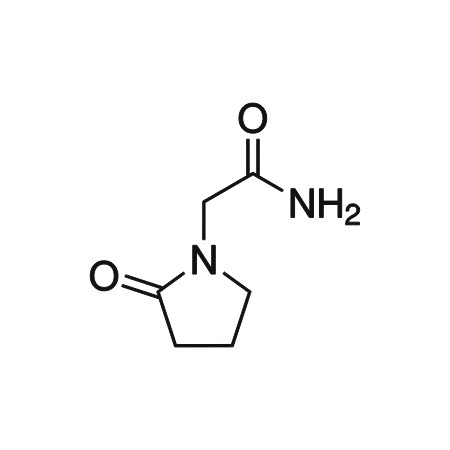
The different types get grouped as they have a similar chemical structure and deliver similar effects.
Piracetam is the most well-known among the racetams and holds the credentials to be the first synthetic nootropic. Piracetam is what experts now classify as an entry-level drug as it is much milder than racetams that came after it compared to its many successors.
Many regard it as a solid choice to start with if you are new to nootropics. It has shown noticeable promise for people with brain aging and moderate effects for healthy adults.
As for feeling its effects, human studies suggest this drug to yield subtler effects that can be experienced after a week or so of taking it. But other, more potent racetams can provide results within a few hours.
Unlike many other types of nootropics, racetams are not stimulants, although some do stimulate but in a manner different from stimulants. Others boost memory, focus, promote creativity and alleviate or calm anxiety.
Each type varies in strength, and certain varieties are better for particular uses.
Noopept
Another popular synthetic smart drug, Noopept, is often compared with racetams given its structural and nootropic similarities with that class of drugs.
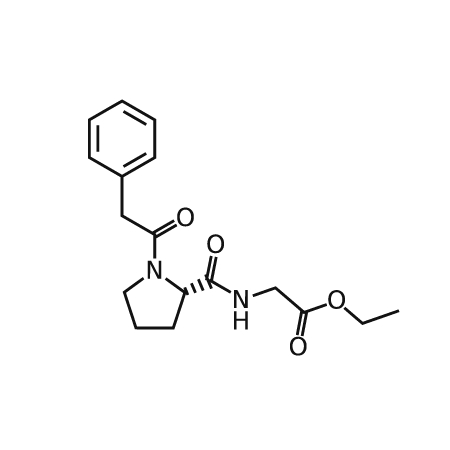
However, it is not technically a racetam but does behave very much like one offering similar benefits such as:
- Short and long-term memory enhancement
- Subtle yet noticeable mental stimulation
- Neuroprotective properties
- Neuroregeneration
- Quicker thinking capabilities
The most common comparison you will come across is between Noopept and Piracetam.
It shares the essential benefits of mental performance, memory consolidation, and information processing with Piracetam but does so with a much smaller dose than that required of Piracetam.
Studies comparing the two will often describe it is 1000 times stronger than Piracetam. It is not only because of the lower dose required but also the much longer drawn-out effects.
Adrafinil (Olmifon)
Adrafinil is a stimulant that shows increased energy levels, prevents fatigue, and boosts wakefulness without causing anxiety.
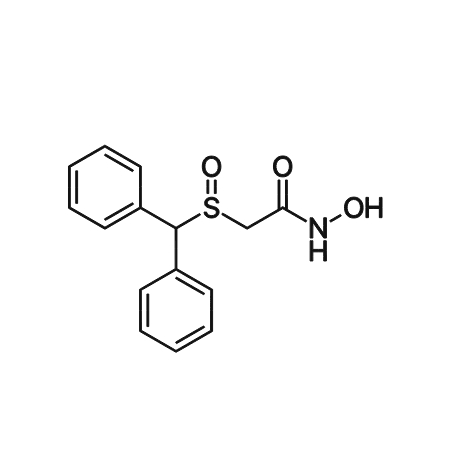
It is the inactive form of Modafinil (coming up next) and was sold throughout Europe under the brand name Olmifon from 1986 until it was discontinued in 2011.
The drug remains unregulated in the US, Canada, the UK and is legal to purchase in those countries.
When converting to Modafinil, only a portion of Adrafinil is converted. It means you would have to use a larger dose of Adrafinil to get the same effect from a smaller amount of Modafinil.
This smart drug has a low incidence of side effects with an equally low risk of tolerance, dependence, or addiction.
Modafinil (Provigil)
Originally developed to treat narcolepsy, Modafinil is now a recognized prescription nootropic taken to enhance focus and maintain alertness during sleep deprivation.
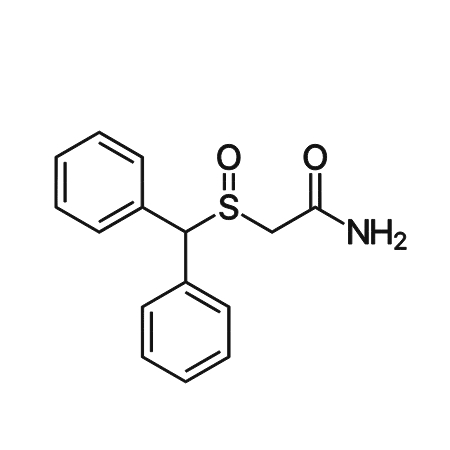
It is a much more potent version of Adrafinil and boasts an impressive duration of effects of up to 20 hours.
Because it is such a high potency drug, experts recommend taking it on alternating days instead of using it only on occasion when you need the extra kick.
But if you suffer from narcolepsy, your doctor will likely prescribe a daily dose to manage the condition.
Its most promising benefits include:
- Alertness
- Wakefulness
- Short-term memory boost
- Fatigue reduction
- Increased confidence
What Are The Side Effects of Nootropics?
Amino acids, herbs, vitamins, and other natural nootropics are typically safe when used at the recommended dosage for healthy individuals.
Many do not present any side effects unless there are allergies involved, and most healthy people can tolerate these reasonably well.
However, you have to be careful when it comes to their synthetic counterparts. Synthetic varieties, including prescription nootropics, present apparent side effects and should never be used without medical supervision.
Adderall, for instance, is known to cause nervousness, headaches, sleeplessness, and decreased appetite.
Ritalin, although a highly endorsed nootropic, can be habit-forming, while Modafinil tends to interact with some prescription drugs and other smart drugs.
Even so, several studies have shown that stimulant medications that have undergone thorough testing and clinical trials are safe and effective.
Another thing to remember here is that since each nootropic alter and influence brain chemistry, their prolonged use, even though safe, can develop tolerance to these smart drugs.
As a result, you may or may not need a larger dose to get the desired effect.
It is not necessarily the case with all nootropics, but for those that may start to lose their potency, experts recommend “cycling” different nootropics.
It means that you take a nootropic on a specific number of days, weeks, or months. This pattern is then followed by a set time period where you don’t use your nootropic so that any tolerance or dependency that may have developed wears off.
This On-Off cycle helps minimize side effects like developing a temporary resistance to the drug’s positive results and allows the nootropic to maintain its effectiveness.
Conclusion
Nootropics have a debatable history that brings them under questioning light.
The success of nootropics naturally comes from their effectiveness. When it comes to proving their effects, limited resources are available, but they may help your brain performance.
Many have shown more significant benefits for individuals with slight mental health issues as compared to healthy people.
So, the dispute behind whether or not some nootropics are an investment worth your time is both a personal and professional matter.
It’s not recommended to exceed the recommended dosage of nootropics unless there is professional reassurance or endorsement behind your decision.

